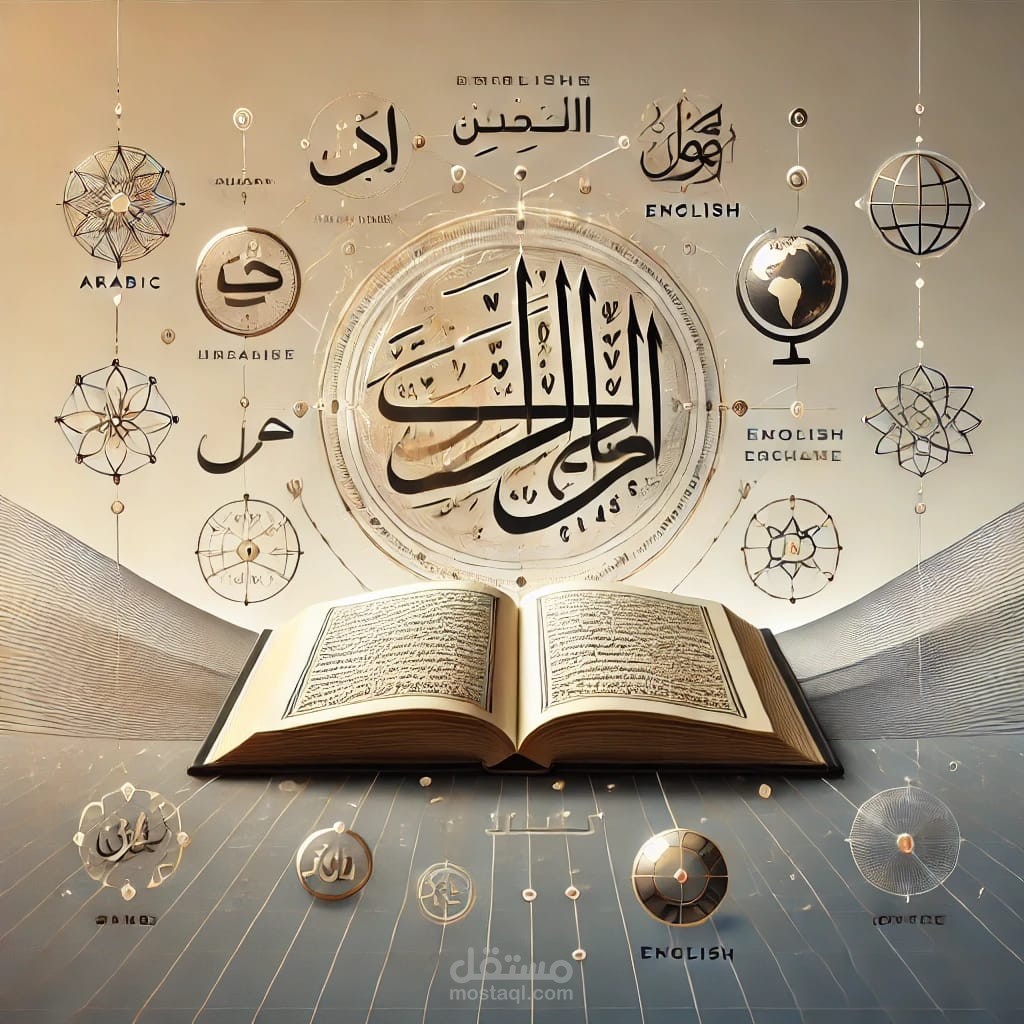ترجمة بحث عن التاريخ الاسلامي من العربية الي الانجليزية
تفاصيل العمل
التاريخ الإسلامي: تطور حضارة وبناء أمة
Islamic History: The Evolution of a Civilization and the Building of a Nation
يُعتبر التاريخ الإسلامي من أبرز محطات التاريخ البشري التي شهدت تطورًا حضاريًا شاملاً في مختلف المجالات. بدأ هذا التاريخ مع بعثة النبي محمد صلى الله عليه وسلم في القرن السابع الميلادي، حيث مثّلت دعوته إلى الإسلام نقطة تحول كبرى في تاريخ الجزيرة العربية، إذ انتقل سكانها من حياة البداوة القبلية إلى تأسيس دولة حضارية محكمة النظام.
Islamic history is considered one of the most significant milestones in human history, characterized by comprehensive civilizational progress in various fields. This history began with the mission of Prophet Muhammad (peace be upon him) in the 7th century CE, marking a major turning point in Arabian history, transforming its people from tribal nomadism into an organized, advanced state.
البدايات والتأسيس
Beginnings and Establishment
بدأت أولى مراحل التاريخ الإسلامي في مكة المكرمة، حيث أعلن النبي محمد صلى الله عليه وسلم رسالة الإسلام، التي تقوم على التوحيد والعدل والمساواة. رغم التحديات التي واجهها المسلمون الأوائل، استطاعوا بناء مجتمع متماسك في المدينة المنورة، حيث كانت وثيقة المدينة أول دستور مكتوب في التاريخ يضمن حقوق الأفراد على اختلاف دياناتهم وأعراقهم.
The early phases of Islamic history began in Mecca, where Prophet Muhammad (peace be upon him) proclaimed the message of Islam, which emphasized monotheism, justice, and equality. Despite the challenges faced by early Muslims, they succeeded in building a cohesive society in Medina, where the "Constitution of Medina" became the first written charter in history ensuring the rights of individuals regardless of their religion or ethnicity.
التوسع والنهضة
Expansion and Renaissance
بعد وفاة النبي، توسعت الدولة الإسلامية بسرعة خلال فترة الخلفاء الراشدين. تمكن المسلمون من نشر الإسلام في مناطق واسعة تشمل شبه الجزيرة العربية والشام والعراق ومصر، بفضل القيم الأخلاقية التي حملها الإسلام وأسلوبهم الحضاري في التعامل مع الشعوب الأخرى.
في العصر الأموي والعباسي، بلغت الحضارة الإسلامية ذروتها، حيث أصبحت بغداد ودمشق مراكز للعلم والثقافة. برع العلماء المسلمون في مختلف المجالات مثل الطب، الرياضيات، الفلك، والفلسفة، وأسهموا في نقل العلوم والمعارف إلى أوروبا.
After the Prophet's death, the Islamic state expanded rapidly during the era of the Rightly Guided Caliphs. Muslims succeeded in spreading Islam across vast regions, including the Arabian Peninsula, the Levant, Iraq, and Egypt, due to the ethical values Islam carried and their civilized approach in dealing with other nations.
During the Umayyad and Abbasid periods, Islamic civilization reached its peak, with cities like Baghdad and Damascus becoming centers of knowledge and culture. Muslim scholars excelled in various fields, such as medicine, mathematics, astronomy, and philosophy, contributing to the transfer of knowledge to Europe.
التأثير الثقافي والحضاري
Cultural and Civilizational Impact
أحد أبرز مظاهر التاريخ الإسلامي هو التأثير العميق الذي تركته الحضارة الإسلامية على العالم. قام المسلمون بترجمة الأعمال الإغريقية والهندية، وأسسوا نظامًا تعليميًا متقدمًا يقوم على البحث والتجربة. كما انتشرت الفنون الإسلامية مثل العمارة والخط العربي، وظهرت المساجد والقصور كأمثلة على الإبداع الفني.
One of the most remarkable aspects of Islamic history is the profound influence Islamic civilization left on the world. Muslims translated Greek and Indian works and established an advanced educational system based on research and experimentation. Islamic arts, such as architecture and calligraphy, flourished, with mosques and palaces standing as testaments to their creative brilliance.
التحديات والانحسار
Challenges and Decline
مع نهاية العصور الوسطى، واجهت الحضارة الإسلامية تحديات عديدة مثل الغزو المغولي والصليبي، إضافة إلى ضعف الحكومات المركزية. رغم ذلك، ظل الإسلام قوة ثقافية وروحية تؤثر في حياة الملايين حول العالم.
Towards the end of the medieval period, Islamic civilization faced numerous challenges, including Mongol invasions, Crusades, and weakening central governments. Nevertheless, Islam remained a cultural and spiritual force influencing millions of lives worldwide.
خلاصة
Conclusion
يعد التاريخ الإسلامي شاهدًا على قدرة الإسلام على بناء حضارة إنسانية متكاملة، حيث جمع بين القيم الدينية والابتكار العلمي والتنوع الثقافي. ورغم التحديات التي مرت بها الأمة الإسلامية، يبقى هذا التاريخ مصدر إلهام ودليلًا على أن النهضة الحقيقية تبدأ من العقيدة الصحيحة والعمل الدؤوب.
Islamic history stands as evidence of Islam’s capacity to build an integrated human civilization, combining religious values with scientific innovation and cultural diversity. Despite the challenges faced by the Muslim world, this history remains a source of inspiration and proof that genuine renaissance begins with sound beliefs and diligent effort.
هذا العرض المختصر يوضح عبقرية الحضارة الإسلامية ودورها في تشكيل العالم كما نعرفه اليوم.
This concise overview illustrates the genius of Islamic civilization and its role in shaping the world as we know it today.
